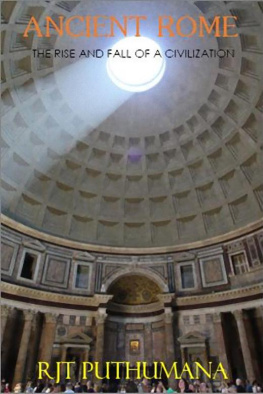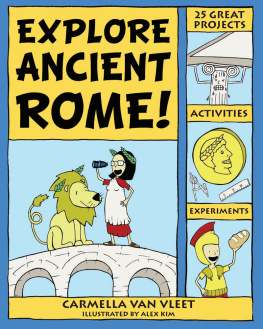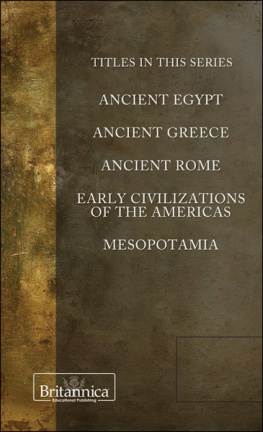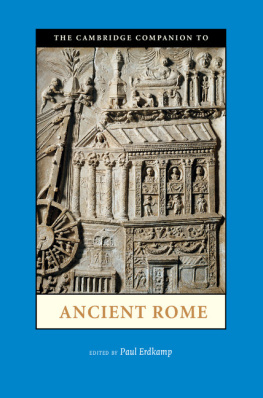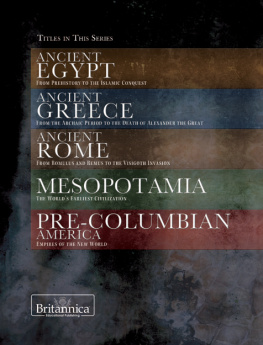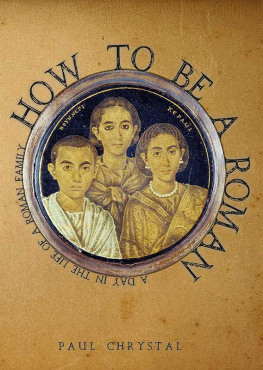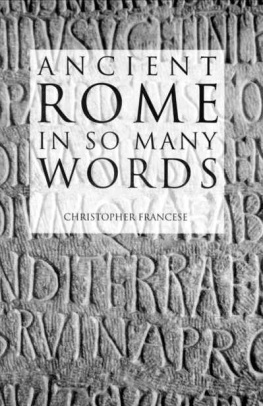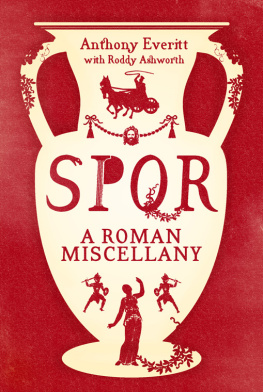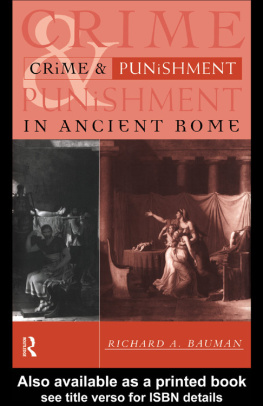Routledge Revivals
THE COMMON PEOPLE OF ANCIENT ROME
STUDIES OF ROMAN LIFE AND LITERATURE
The Common People of Ancient Rome
Studies of Roman Life and Literature
By
Frank Frost Abbott
Kennedy Professor of the Latin Language and Literature
in Princeton University
First published in 1911 by Charles Scribner's Sons
This edition first published in 2018 by Routledge
2 Park Square, Milton Park, Abingdon, Oxon, OX14 4RN
and by Routledge
711 Third Avenue, New York, NY 10017
Routledge is an imprint of the Taylor & Francis Group, an informa business
1911 Taylor & Francis.
All rights reserved. No part of this book may be reprinted or reproduced or utilised in any form or by any electronic, mechanical, or other means, now known or hereafter invented, including photocopying and recording, or in any information storage or retrieval system, without permission in writing from the publishers.
Publisher's Note
The publisher has gone to great lengths to ensure the quality of this reprint but points out that some imperfections in the original copies may be apparent.
Disclaimer
The publisher has made every effort to trace copyright holders and welcomes correspondence from those they have been unable to contact.
A Library of Congress record exists under ISBN: 11031496
ISBN 13: 978-1-138-55395-8 (hbk)
ISBN 13: 978-0-203-70563-6 (ebk)
BY THE SAME AUTHOR
SOCIETY AND POLITICS IN ANCIENT ROME net, $1.25
THE COMMON PEOPLE OF ANCIENT ROME
STUDIES OF ROMAN LIFE AND LITERATURE
THE COMMON PEOPLE OF ANCIENT ROME
STUDIES OF ROMAN LIFE AND LITERATURE
BY
FRANK FROST ABBOTT
Kennedy Professor of the Latin Language and Literature in Princeton University
NEW YORK CHARLES SCRIBNER'S SONS 1912
COPYRIGHT, 1911, BY CHARLES SCRIBNER'S SONS
Published November, 1911
Dedicated
to
J. H. A.
Prefatory Note
THIS book, like the volume on "Society and Politics in Ancient Rome," deals with the life of the common people, with their language and literature, their occupations and amusements, and with their social, political, and economic conditions. We are interested in the common people of Rome because they made the Roman Empire what it was. They carried the Roman standards to the Euphrates and the Atlantic; they lived abroad as traders, farmers, and soldiers to hold and Romanize the provinces, or they stayed at home, working as carpenters, masons, or bakers, to supply the daily needs of the capital.
The other side of the subject which has engaged the attention of the author in studying these topics has been the many points of similarity which arise between ancient and modern conditions, and between the problems which the Roman faced and those which confront us. What policy shall the government adopt toward corporations? How can the cost of living be kept down? What effect have private benefactions on the character of a people? Shall a nation try to introduce its own language into the territory of a subject people, or shall it allow the native language to be used, and, if it seeks to introduce its own tongue, how can it best accomplish its object? The Roman attacked all these questions, solved some of them admirably, and failed with others egregiously. His successes and his failures are perhaps equally illuminating, and the fact that his attempts to improve social and economic conditions run through a period of a thousand years should make the study of them of the greater interest and value to us.
Of the chapters which this book contains, the article on "The Origin of the Realistic Romance among the Romans" appeared originally in Classical Philology , and the author is indebted to the editors of that periodical for permission to reprint it here. The other papers are now published for the first time.
It has not seemed advisable to refer to the sources to substantiate every opinion which has been expressed, but a few references have been given in the foot-notes mainly for the sake of the reader who may wish to follow some subject farther than has been possible in these brief chapters. The proofs had to be corrected while the author was away from his own books, so that he was unable to make a final verification of two or three of the citations, but he trusts that they, as well as the others, are accurate. He takes this opportunity to acknowledge his indebtedness to Dr. Donald Blythe Durham, of Princeton University, for the preparation of the index.
FRANK FROST ABBOTT.
EINSIEDELN, SWITZERLAND
September 2, 1911
Contents
THE COMMON PEOPLE OF ANCIENT ROME
HOW the armies of Rome mastered the nations of the world is known to every reader of history, but the story of the conquest by Latin of the languages of the world is vague in the minds of most of us. If we should ask ourselves how it came about, we should probably think of the world-wide supremacy of Latin as a natural result of the world-wide supremacy of the Roman legions or of Roman law. But in making this assumption we should be shutting our eyes to the history of our own times. A conquered people does not necessarily accept, perhaps it has not commonly accepted, the tongue of its master. In his "Ancient and Modern Imperialism" Lord Cromer States that in India only one hundred people in every ten thousand can read and write English, and this condition exists after an occupation of one hundred and fifty years or more. He adds: "There does not appear the least prospect of French supplanting Arabic in Algeria." In comparing the results of ancient and modern methods perhaps he should have taken into account the fact that India and Algeria have literatures of their own, which most of the outlying peoples subdued by Rome did not have, and these literatures may have strengthened the resistance which the tongue of the conquered people has offered to that of the conqueror, but, even when allowance is made for this fact, the difference in resultant conditions is surprising. From its narrow confines, within a little district on the banks of the Tiber, covering, at the close of the fifth century B. C., less than a hundred square miles, Latin spread through Italy and the islands of the Mediterranean, through France, Spain, England, northern Africa, and the Danubian provinces, triumphing over all the other tongues of those regions more completely than Roman arms triumphed over the peoples using them.
In tracing the story we must keep in our mind's eye the linguistic geography of Italy, just as we must remember the political geography of the peninsula in following Rome's territorial expansion. Let us think at the out and as late as the close of the third century before our era, Plautus pokes fun in his comedies at the provincialism of Prneste.
The towns which we have mentioned were only a few miles from Rome. Beyond them, and occupying central Italy and a large part of southern Italy, were people who spoke Oscan and the other Italic dialects, which were related to Latin, and yet quite distinct from it. In the seaports of the south Greek was spoken, while the Messapians and Iapygians occupied Calabria. To the north of Rome were the mysterious Etruscans and the almost equally puzzling Venetians and Ligurians. When we follow the Roman legions across the Alps into Switzerland, France, England, Spain, and Africa, we enter a jungle, as it were, of languages and dialects. A mere reading of the list of tongues with which Latin was brought into contact, if such a list could be drawn up, would bring weariness to the flesh. In the part of Gaul conquered by Csar, for instance, he tells us that there were three independent languages, and sixty distinct states, whose peoples doubtless differed from one another in their speech. If we look at a map of the Roman world under Augustus, with the Atlantic to bound it on the west, the Euphrates on the east, the desert of Sahara on the south, and the Rhine and Danube on the north, and recall the fact that the linguistic conditions which Csar found in Gaul in 58 B. C. were typical of what confronted Latin in a great many of the western, southern, and northern provinces, the fact that Latin subdued all these different tongues, and became the every-day speech of these different peoples, will be recognized as one of the marvels of history. In fact, so firmly did it establish itself, that it withstood the assaults of the invading Gothic, Lombardic, Frankish, and Burgundian, and has continued to hold to our own day a very large part of the territory which it acquired some two thousand years ago.


